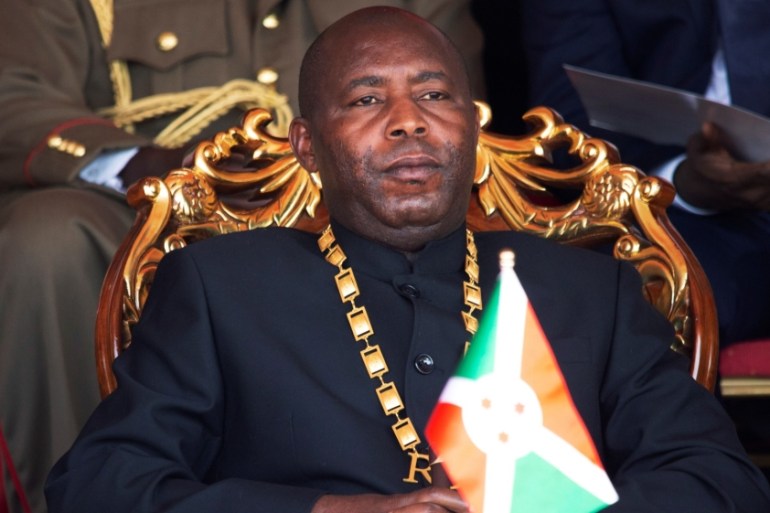
President Ndayishimiye accuses Rwanda of backing DRC-based armed group Red Tabara against his government.
Burundi’s President elect Evariste Ndayishimiye attends his inauguration ceremony in Gitega, Burundi June 18, 2020. [Evrard Ngendakumana/Reuters]
The Rwandan government says Burundi had decided to shut its border with the East African nation, weeks after its president accused Kigali of hosting a rebel group.
In late December, Burundi’s president, Evariste Ndayishimiye, accused Rwanda of hosting and training the Red Tabara rebel group, which claimed responsibility for an attack near Burundi’s western border with the Democratic Republic of the Congo (DRC). Rwanda has rejected his allegations.
A Rwanda spokesperson said on Thursday that the government learned about Burundi’s border closure through media reports, adding that it violated the principles of a regional bloc both are members of.
“This unfortunate decision will restrict the free movement of people and goods between the two countries and violates the principles of regional cooperation and integration of the East African Community,” Yolande Makolo said.
“Today we closed the borders, and someone who will go there will not pass,” Burundian Interior Minister Martin Niteretse was quoted as saying on Thursday by local media.
Burundi has said the December attack killed 20 people while Red Tabara said on the social media platform X that it killed nine soldiers and a police officer.
Red Tabara has been battling Burundi’s government from bases in the eastern DRC since 2015.
Regional rifts
Relations between some nations within the East African Community (EAC) – which also includes Uganda, Kenya, Tanzania, South Sudan, the DRC, and Somalia – have been frosty for years.
Uganda and Rwanda reopened their border posts after a three-year closure caused by Kigali’s claim that Kampala was supporting dissents to overthrow the Rwandan government.
The DRC has repeatedly accused Rwanda of backing the armed group M23, which has triggered the displacement of millions of Congolese. From 2022 to 2023, the EAC deployed soldiers to battle the group and scores of others that operate in Africa’s second largest country by landmass, but Rwandese soldiers were excluded.
United Nations experts and the European Union have also cited evidence of Kigali’s support for M23, but Kigali denies the allegations. Angolan efforts to mediate between the DRC and Rwanda have failed.
In December, DRC President Felix Tshisekedi further intensified the situation during a campaign stop.
“I’ve had enough of invasions and M23 rebels backed by Kigali,” Tshisekedi said. “If you re-elect me and Rwanda persists, … I will request parliament and Congress to authorise a declaration of war. We will march on Kigali. Tell Kagame those days of playing games with Congolese leaders are over.”
